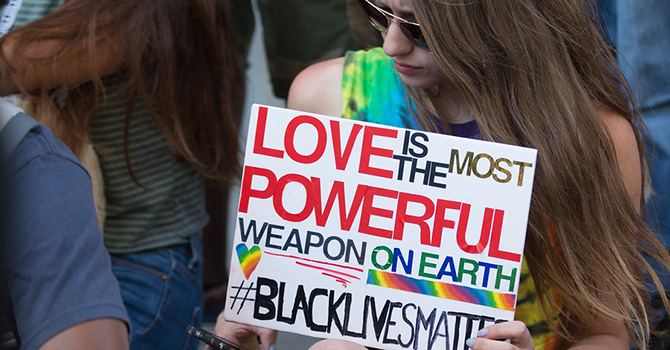A few months ago, I wrote a piece about what I and many people of color need from white people, particularly those who consider themselves allies.
I was moved to write after the shooting death of Terence Crutcher in Tulsa, Oklahoma. You may recall that Crutcher was shot by police officer Betty Shelby while he walked away from her with his hands in the air. Shelby has been charged with manslaughter.
That tragedy -- yet another unarmed black man killed by police -- prompted me to reflect on how white allies can help.
In the blog post, I outlined five ways: don’t silence us; confess the sin of racism; use your privilege for good; amplify black voices; and transfer resources. The article was well-received, and generally people agreed that these were practical steps that could aid in movements for justice.
Unsurprisingly, it was the last of the five that garnered the least enthusiasm. And yet in light of the violence that has been highlighted in the last few years, and with the recent anxiety surrounding the president-elect, it is this element of the work for justice that I believe can have the greatest impact, by engaging institutions as well as individuals.
When I say “transfer resources,” it’s easy to assume that I simply mean “write a check.” There’s an element of that, of course. But while at its best giving money can be about lifting other people up out of dire circumstances, at its worst it can be yet another form of oppression.
When money is offered with strings attached, it is a means of oppression. Similarly, when offered in a quid-pro-quo arrangement, money can be a form of manipulation. And when money is offered in pity, it is a means of condescension.
A true transfer of resources is an investment in a person, program or place whose work will promote racial justice on a systemic level.
So how can Christian institutions make these kinds of meaningful investments?
One of the most effective ways is to invest in minority leaders directly. The cost of theological education, for example, is often prohibitive for those in disenfranchised populations. Creating scholarships that will fund the education of future leaders is a key instrument for making sure that diverse voices are heard within the institution and out in the world.
Further, because many minority clergy answer their calls while working a second job to make ends meet, institutions might also consider a fund that creates a safety net for vulnerable ministers working on the front lines.
What is being studied is just as important as who is studying. The thinking and writing of white authors -- and specifically, white male authors -- is the norm in many of our institutions. Learning from scholarship that is created from the margins could allow church leaders to shape their ministries with those concerns at the forefront.
Endowed chairs for scholarship from marginalized communities could help ensure that future leaders are exposed to width and breadth of religious thought. And guest lectures and speaker series offered by seminaries and denominations could provide additional space for these scholars to be heard.
Beyond formal scholarship, it is crucial for institutions to invest in programs that deal directly with the concerns of marginalized people. That can include anti-racism training, for sure, but it must also include inviting those on the margins to deal with their issues in a safe space sanctioned by the institution.
Seminaries and denominations can provide space and resources for clergy with common backgrounds to gather and share frustrations and concerns absent the stress that often comes with tempering language to accommodate the dominant culture of the institution.
Further, institutions can make capital investments in traditional places of safety in minority communities. In many disenfranchised communities, church buildings remain the center of community life.
Church buildings house nonprofits, provide needed social services and create space for community-based groups to gather. Yet all of these valuable services happen in buildings that are often dealing with decades of neglect or, increasingly, vandalism and defacement.
In a time when many of our institutions are facing issues of scarcity, it may seem unrealistic to attempt to reallocate resources in these ways.
But Jesus’ words that where our treasure is, our heart will be also (Matthew 6:21) ring true here. For those of us who have a heart to stem the tide of racial animosity in this country, we have to begin to rethink where we send our resources and whether our rhetoric about racial justice lines up with our budget.
This is a vital question for institutions that have historic ties to racial injustice, as many of our seminaries, universities and denominations do. To begin to heal the wounds of racial sin, true leaders must be willing to put their money where their mouth is.








